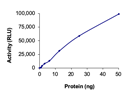
BMP2K, Active (B03B-11G)
FOR BULK ORDER REQUESTS PLEASE CONTACT US
Description :Recombinant mouse BMP2K (1-422) was expressed by baculovirus in Sf9 insect cells using an N-terminal GST tag.
Species :Mouse
Tag :GST tag
Expression System:Sf9 insect cells using baculovirus
Sequence :1-422
Genbank Number :NM_080708
Specific Activity :Sample Activity Plot. For specific information on a given lot, see related technical data sheet.
Purity :Sample Purity Data. For specific information on a given lot, see related technical data sheet.
Storage, Stability and Shipping :Store product at –70oC. For optimal storage, aliquot target into smaller quantities after centrifugation and store at recommended temperature. For most favorable performance, avoid repeated handling and multiple freeze/thaw cycles.
Applications :Kinase Assay, Western Blot
Molecular Weight :~70 kDa
Gene Aliases :BIKE; 4933417M22Rik; AA673486; AV128808
Scientific Background :BMP2K or Bone morphogenic protein 2 inducible kinase is the human homolog of mouse BMP-2-inducible kinase which plays a key role in skeletal development and patterning. BMP2K is a serine/threonine protein kinase which contains a nuclear localization signal and plays a regulatory role in attenuating the program of osteoblast differentiation. BMP2K gene is strongly correlated with high myopia and may contribute to a genetic risk factor for high degrees of myopic pathogenesis (1). BMP-2 expression is suppressed by an EP4 receptor antagonist and PGE2 produced by COX-2 increases BMP-2 expression via binding the EP4 receptor (2).
References :
1. Liu HP. et.al: A novel genetic variant of BMP2K contributes to high myopia. J Clin Lab Anal. 2009;23(6):362-7.
2. Arikawa T. et.al: Regulation of bone morphogenetic protein-2 expression by endogenous prostaglandin E2 in human mesenchymal stem cells. J Cell Physiol. 2004 Sep;200(3):400-6.
Product Sheets (By Lot #) :
Research Areas :AKT/PKB Pathway, Cancer, ERK/MAPK Pathway, Inflammation, Invasion/Metastasis, JNK/SAPK Pathway, NfkB Pathway, p38 Pathway, PKA/PKC Pathway, WNT Signaling
